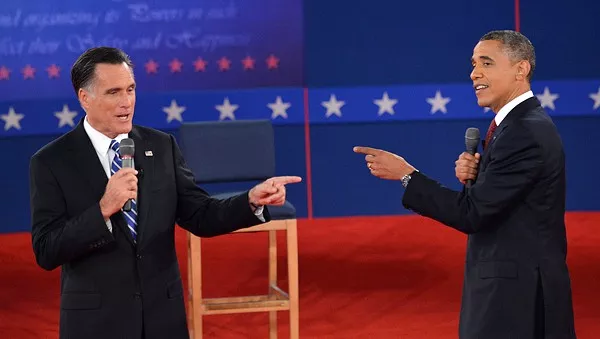I got the idea to host a bipartisan debate party during the Republican National Convention. As I watched the video meant to humanize and reintroduce Gov. Mitt Romney to America, I was surprised to hear the candidate’s friends and family use the word “cheap” over and over to describe him. I immediately sent a Facebook message to my friend Damián, a Libertarian who generally votes Republican. “Why do they keep calling him cheap like it’s a good thing?” I asked. “That’s not an attribute I would generally consider positive.” Damián was shocked at my assertion. “I think a lot of Americans find it positive,” he typed back. “I want my president to be cheap with my money.”
I realized that this difference in opinion — this argument about whether being cheap is a positive or a negative trait — is at the core of this election’s political divide. And I decided that I wanted to explore it further.
So, I devised a plan.

Damián and I would each recruit a group of like-minded friends to come over to my house and watch the second presidential debate. (I chose the second debate because the first one coincided with Creative Loafing’s Best of Charlotte party and, as much as I love to talk politics, an open bar will pretty much trump anything in my book.) Before the start of the debate, we would have our own thoughtful and civil discussion about the election’s biggest issues. Then, we would watch the candidates together and share our thoughts about their performances.
My husband, who had never seen me discuss politics with a right-leaning conservative in a “civil and thoughtful” manner, thought it was a bad idea. He was worried that Damián, a close family friend, would never want to speak to us again after I lost my cool and raised my voice as I generally do when engaged in heated political discourse. I assured him that that would not happen. “This will be an exercise in self-control,” I said. “You’re always telling me that I need to learn to agree to disagree.”
On Oct. 16, eight of us gathered over a plate of empanadas (courtesy of my mother-in-law) and a few six-packs of beer. We discussed issues ranging from immigration to civil rights to education, and we actually managed to do so civilly. Damián and his team argued for small government that leaves decisions about health care, retirement, and even gender and race discrimination up to the individual and the free market. My team and I argued for a more collective society, where government provides a safety net for the poor, defends the civil rights of all persons, and creates opportunities for things like higher education.
After the debate, I’m pretty sure everyone went home with exactly the same ideas and opinions they had coming in.
For several days after the party, I thought about and digested our conversation. My intention had been to hear and understand where the other side is coming from, but also to prove to prove them wrong; to shame them into admitting that they don’t care about their fellow man.
It’s so clear to me that all people should have access to healthcare, that employers should not be allowed to discriminate, and that being generous is a more desirable quality than being cheap, that I was convinced I’d be able to make them see things my way.
I failed.
Damián and his team have a deeply rooted belief in individual liberty. They aren’t racist and don’t think that poor people should die on the street without access to health care. They just don’t think the government should meddle in these matters. Individuals should come together and help the poor. Individuals should decide to not patron private businesses that discriminate. Individuals should be responsible for saving for their own retirement.
It’s a lovely idea that’s based on the assumption that all, or at least most individuals, are innately compassionate. Unfortunately, our nation’s history — from slavery to North Carolina’s recent approval of Amendment One — simply does not support it. Damián’s notion that most Americans see being cheap as a positive trait doesn’t help either.
Still, it’s hard to declare that the other side is wrong when the central crux of your argument is: people, as a whole, can’t be trusted. I hate that notion. I want to believe that most people are good and caring.
It’s been over a week, and I’m still trying to wrap my head around what I learned from the experience. The only conclusion I’ve been able to come up with has nothing to do with politics. It’s a very personal one.
If I want to believe that most people are good and caring, if I want the concept of “love thy neighbor” to be a driving force in our society, the only person I can persuade is me. And when it comes to politics, I get a much bigger thrill from shaming the other side than from arguing that my opinion is right. And that’s not a very good, or caring, or loving attitude.
I will still be voting for the president. And I still believe that the government should play a role in health care, people’s welfare and education. I think that, considering the society we live in, government intervention is the only way to ensure that the poor and marginalized don’t go hungry or die from preventable diseases. For me, it’s incredibly important to live in a country that promotes equal opportunity and punishes those who discriminate. In a country with a leader who considers being generous a desirable trait.
I will continue to defend these ideas.
But I will also stop trying so hard to prove the other side wrong.
